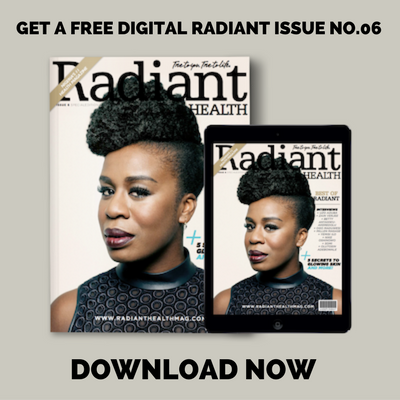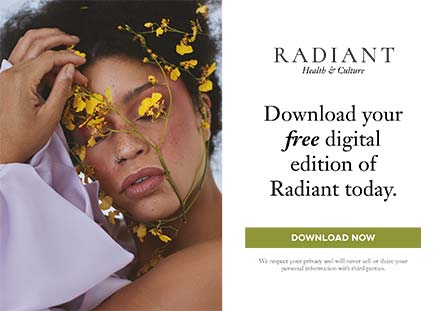For Us, By Us: BLK + GRN Puts Natural Care Products for Black Women on the Map
By Chinyere AmobiPublished: May 2, 2019
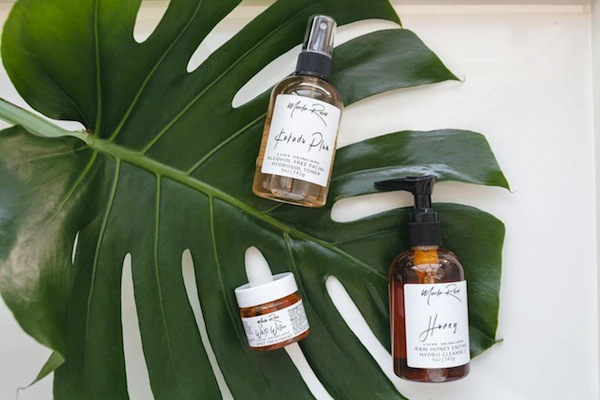
A longside the natural hair movement, which has had black women throwing away their relaxers and vlogging their liberation from chemically processed tresses, there’s been a growing consciousness about what we’re putting on other parts of our bodies. With research showing that many of the products marketed toward black women are full of harsh chemicals and toxins, this movement comes right on time.
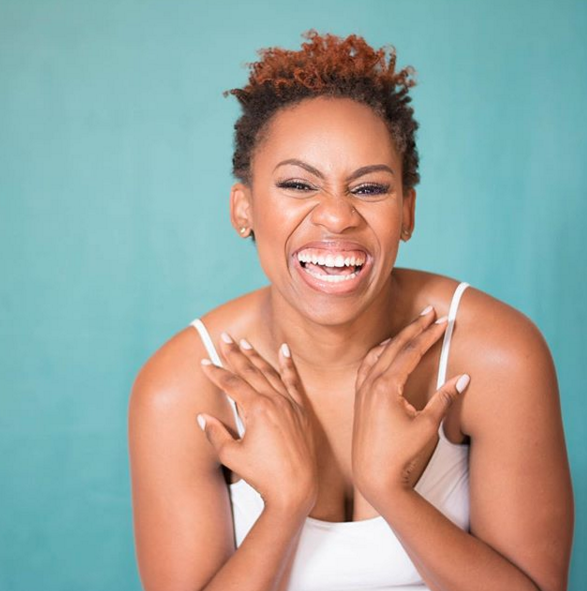
Kristin Henderson, Founder of BLK+GRN
Kristian Henderson, DrPH, founder of BLK + GRN, is on a mission to make it as easy as possible for black women to find natural products made within the community, for the community. In this edited interview with Radiant Health Magazine, discusses the inspiration behind BLK + GRN and how she wants to use this opportunity to circulate wealth within the black community.
Radiant Health: How did BLK + GRN come about?
Kristian Henderson: I started BLK + GRN about a year ago for a couple of reasons. I was working at The Johns Hopkins Hospital, and I was constantly seeing black women that were dealing with health issues that would be really controllable and avoidable if they changed a couple of their habits. But we really weren’t talking about this. We know that even if we control for insurance, education, and income, black women still have worse health outcomes than their white counterparts. And we also know that the traditional healthcare system isn’t working for black women.
There was a lot of conversation around food and diet, but there wasn’t much of a conversation around products. We’re seeing research emerge that long-term exposure to the toxic chemicals in products may be having an adverse effect on women, and I really wanted to see if I could help disrupt this market. Black women spend about twice as much as others on personal care products, yet 75% of the products that are specifically targeted to black women have ingredients that are considered toxic.
I personally went out on my own journey of trying to use healthier, more natural products, and I wanted to connect other black women with these products. I was also reading this book called Our Black Year about a black woman trying to purchase all black for a full year, and the trials and tribulations of that. I started thinking it would be amazing if I could buy all natural and organic products that were also black-owned. It had the social aspect of the importance of investing in black businesses, but it also had a health aspect, recognizing the importance of eliminating these toxic products from our regimen.
RH: What kind of health issues were you seeing in the women you observed at The Johns Hopkins Hospital?
KH: We know that black women have a higher incidence rate of health conditions such as fibroids, breast cancer, infertility, hormone imbalances, and other illnesses that could possibly be linked to the products we’re using. The research isn’t as strong as we would like it to be, but we’re starting to see some connections. My philosophy is: understand where the research dollars are coming from. It’s a lot harder to get funding for studies that disrupt the industry, so I err on the side of “If we don’t know that it’s good for you, let’s try to avoid it.”
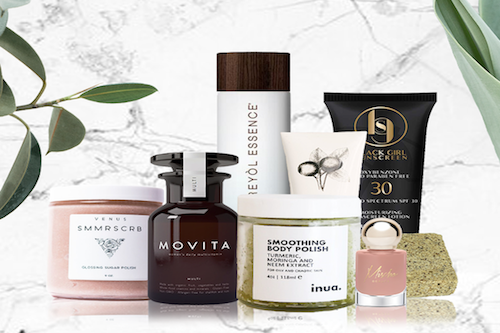
RH: On your site, you mention the Toxic Twenty List. What is that, and how can we avoid these ingredients in our everyday life?
KH: The list includes 20 ingredients that we don’t allow [in products sold] on our website. We looked at products being targeted to black women and we looked at the research behind certain ingredients that we know have harmful effects. We also looked at other countries and what they were banning from personal care products. The U.S. is very much behind everyone else in controlling and regulating personal care products. Other countries are ahead of us, so we looked at their lists of products and ingredients to see what we should ban.
When you’re dealing with personal care products, it’s not as easy to understand ingredient lists, compared to food labels. I remember with the clean food movement, a lot of people were trying to avoid eating foods with ingredients whose name they couldn’t pronounce. But with many personal care products, there can be names you can’t pronounce that aren’t necessarily bad for you. The Latin name for shea butter or some plant abstract might sound like a chemical when it really isn’t. So, it can be really difficult for people to know what a bad ingredient is and isn’t. We came up with the Toxic Twenty as a cheat sheet on what you should avoid.
RH: Are there any surprising areas of our lives where we might be using toxic products?
KH: Yes! What I like to talk about a lot is your laundry, because people don’t really think of that. Most laundry detergents, fabric softeners, and dryer sheets may not even have the ingredients on them, so you have no idea what you’re putting on your clothes.
Fabric softener is specifically designed to go into your clothing so it releases over time. Even if you use a product once, you can be exposed for a really long time, which is one of the reasons why it’s dangerous. When you use any sort of higher-end clothing, baby clothing, even athletic wear, they often tell you not to use fabric softener because it coats the clothes and can deteriorate the fabric over time. So not only can it have a negative impact on your health, but also the quality of clothes over time because it’s full of carcinogens and toxins.
On our website we sell dryer balls, which replace the need for dryer sheets and fabric softener. You put these wool balls in your dryer with your clothes, and you can put a couple drops of essential oils on the balls. They do the same thing as dryer sheets and fabric softener: they soften the clothes and help them dry faster. By putting the few drops of essential oils onto the dryer balls, you’re also infusing your clothes with the smell. It’s a much healthier way of getting those same goals without introducing all these toxins into your clothes and polluting your skin and breathing air.
RH: Part of your purpose in working exclusively with black artisans is to keep and generate wealth in the black community. Can you talk more about that?
KH: When I started to think about my purchasing habits in that way, it became important to me that I was aligned with my own personal values. If I say I value small businesses, women-owned businesses, and those that offer a living wage, am I purchasing from them? Am I making sure the companies I purchase from have the same ethics and values that I have?
When I challenged myself to this and realized what my values were, I really understood that in order to build wealth in the black community, it’s really important for us to support our entrepreneurs and keep that money in the black community. A black-owned business is much more likely to hire other black people to work for them. It creates jobs, wealth, and a system that continues to feed itself. I wanted to do my part in supporting as many of these businesses as possible.
What I heard from folks was that it was difficult to find quality products. People didn’t know which products were black-owned and which weren’t, and people really wanted them all to exist in one place that was easy to access, high quality, and with a great customer service experience. So that was what I wanted to accomplish with BLK + GRN: allowing people to support black-owned businesses without having to make a compromise in the quality of their products.
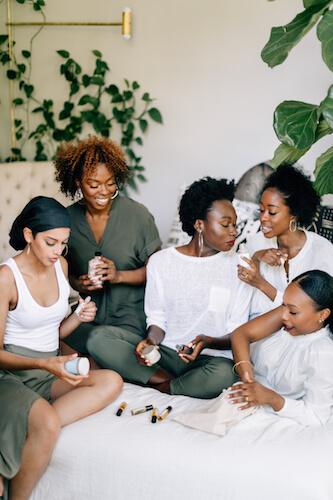
RH: What are some easy ways that black women can incorporate more all-natural products into their routine?
KH: I think it just comes with the mindset; you have to decide that it’s important to you. After you decide that, you can’t do everything overnight. There are some people that just throw away all their products and start brand new, but for a lot of people that’s difficult.
Start with the products that you’re not happy with. It’s a lot harder to abandon something that’s working for you. After you’ve switched those out and found success with other products, it’s a lot easier to begin the journey. You should also start one category at a time.
With the natural hair boom, we started looking at ingredients and becoming more conscientious about what we were putting in our hair. We can apply that same consciousness to what we’re putting on our body and our entire home, one piece at a time.
RH: What kind of reception has BLK + GRN experienced so far?
KH: It’s been really amazing; people are really happy that this exists. There’s a lot of black women who are looking for a safe space and products that support them on their wellness journey. People are really happy to find our platform and a safe space, through our social media and the community we’re creating, in trying to make wellness look not so white-washed.
A lot of times, what we see in the industry of wellness doesn’t really include black women. We’re trying to change that narrative and connect them with products where they see themselves in advertising and packaging. And where the women who created the products were thinking about black women and tailoring to our specific needs.
For instance, we have Black Girl Sunscreen that was specifically designed for us because sunscreen tends to leave a white cast on the face. This is particularly troublesome for people with dark skin, so oftentimes we don’t wear it. Black Girl Sunscreen created a product that doesn’t have that white cast but includes more of a moisturizer, to specifically solve a problem that black women were having.
A lot of our products are exactly that. We were having specific problems, and like we always do, black women went and created the solutions. With BLK + GRN, we’re bringing all of those solutions together on one platform.
To learn more about BLK + GRN, visit www.blkgrn.com. Radiant readers can enjoy 15% off their purchase with code Radiant15.
Like what you're reading? Sign up for our free newsletter and never miss a post! Plus get a FREE digital version of our Issue No.10 with sign up.

- Black Women Share Their Experiences with High Blood Pressure - September 24, 2021
- Breast Cancer Survivor VeRitta Smith on Self Care And Finding Purpose in the Midst of the Storm - February 13, 2019
- Filmmaker Adeyemi Michael Reimagines the Immigrant Narrative While Paying Tribute to His Mother in the Captivating Short Film, “Entitled” - May 8, 2019
- For Us, By Us: BLK + GRN Puts Natural Care Products for Black Women on the Map - May 2, 2019
- Flying Over 50: How Pole Dancing Helped 58-year Old Makeda Smith Reclaim Her Life - January 16, 2019
- Playwright Ngozi Anyanwu taps into her Nigerian-American upbringing for a play on grief and healing - October 19, 2018
- Cameroonian filmmaker Cyrielle Raingou on her upcoming documentary and her country on the brink of civil war - November 7, 2018
- Are Women ‘Hormonal?’ Yes, And So Is Everyone Else! - May 23, 2019
- How The All of Us Research is Restoring Trust and Bringing A Much-Needed Diversity to Medical Research - April 10, 2019
- Getting behind youth in the fight against HIV/AIDS in Nigeria - March 6, 2019




